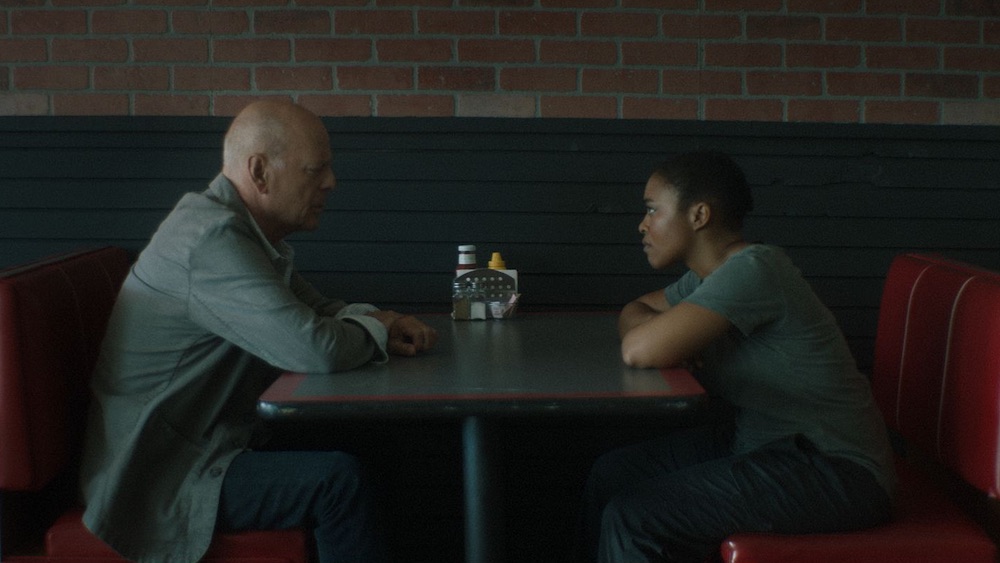
It has been rather bewildering to witness no less than two dozen low-budget action movies involving Bruce Willis being churned out over the last three years. That legacy-dimming run ends with “Assassin,” which arrives almost exactly one annum after his family announced a retirement due to diagnosis of cognitive disorder aphasia (and, later, frontotemporal dementia). Like nearly every preceding opus featuring the erstwhile global superstar in roles of prominent billing but little screentime, this rote genre exercise is little more than a time-killer, and as such a regrettable close to a significant career. Saban Films is releasing it to U.S. theaters, digital and VOD platforms on March 31.
It is … um, sometime in the near future, somewhere or other. Alexa (Nomzamo Mbatha) and Sebastian (Mustafa Shakir) are a married couple both in the U.S. Army, though they get to see each other less than they’d like between separate tours of duty. An unhappy reunion occurs when he comes home in a long-term coma. Demanding to know what happened, Alexa is told Sebastian was shot while inhabiting another body on top-secret assignment — it’s “the future of drone warfare,” snarls chief Valmora (Willis) — and now she must follow his lead to save him.
That means donning a wetsuit, getting in an ice-filled clawfoot bathtub in an abandoned factory and somehow taking over the minds of complete strangers in order to assassinate the subordinates protecting international villain Adrian (Dominic Purcell). He is in possession of the high-tech thingie that will restore Sebastian’s consciousness, and should be eliminated to make the world a better place, anyhow.
So under the instruction of Valmora’s associates Olivia (Fernanda Andrade) and Marko (Barry Jay Minoff), Alexa keeps jumping into unfamiliar bodies in unfamiliar settings to kill people she’s never seen before. (Afterward, the “hosts” have no memory of any mayhem they committed.) Eventually she is able to reach Adrian himself while in the guise of Mali (Andy Allo), a painter whose work he’s collecting.
Firsttime feature director Jesse Atlas calls “Atlas” an “exploration of identity,” and in theory, it’s the sort of thinky sci-fi that requires little or no expensive visual flash — nor does it get any here. But such enterprises need ingenious plotting and credible characters to compel attention. Unfortunately, this movie pretty much consists of figures sans backstory or much personality killing others with even less of either, in episodes minus any particular flair for action or suspense.
The notion of inhabiting another person’s physicality should be startling. But our dullish heroine (whether she’s wearing the face of Mbatha, Allo or several more-briefly-seen cast members) seems a perpetual deer before headlights, albeit one who unconvincingly can outfight any security personnel or other foes. The fantasy conceit is so weakly put across, it boils down to “Oh look! My voice-over is telling you my character is inside this other actor now!”
Not helping suspend our disbelief is the cheap depiction of supposedly futuristic technology (one laptop, plus what looks like an old stereo speaker), and other factors that speak to nothing but the film’s own limited budgetary resources. Imaginative indie sci-fi films have been made on yea slimmer means. But they had the cleverness and emotional engagement that the director and Aaron Wolfe’s screenplay lacks.
Atlas has worked primarily as an editor (though that role here is credited to Philip Harrison), and the film does move at a lively-enough pace, in diverse, handsome-enough locations competently photographed by Bryan Koss. Still, there’s never a sense of place — the Alabama-shot production is very vague on geographic specifics, suggesting a global sprawl that deflates when we realize the heroine only requires a short car drive to reach a supposedly elusive villain’s lair. (And why Purcell plays that villain as a seemingly nice, emotionally vulnerable fella also puzzles.) Thus those settings come across as simply whatever was available to the location scout. Likewise, the multinational cast seems assembled for reasons other than serving defined character needs. None of them are able to rise above the vague material.
As for Willis, he’s on-screen a fair amount in comparison to some prior so-called “geezer teasers” in which he had glorified cameos. Yet his climactic scene with Mbatha is the only one in which he’s clearly in the same shot with another lead performer — and his walk-through performance seems downright bored when Valmora may be facing death.













